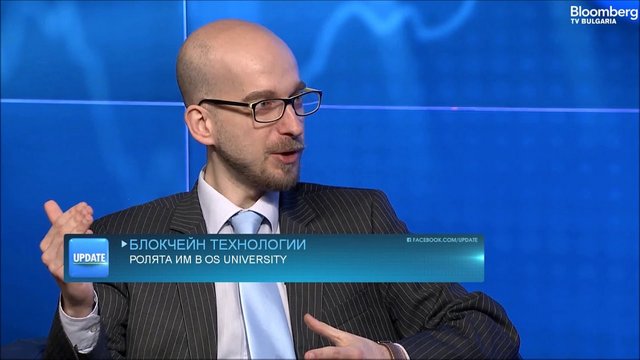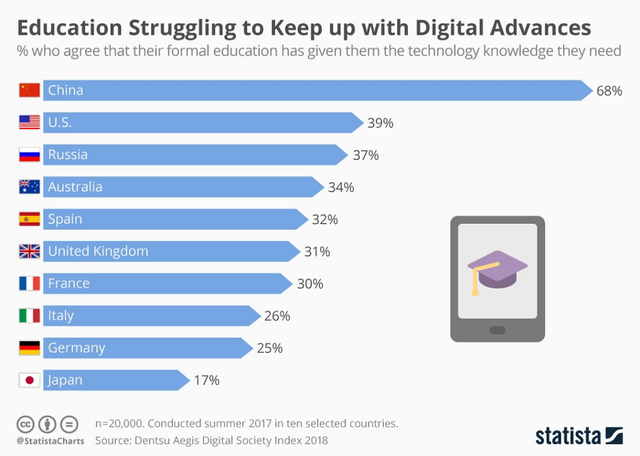OS.University interview on Bloomberg!

The Project lead of OS.University, Hristian Daskalov, participated in Bloomberg tech show UpDate. Hristian shared more on our progress on the application of blockchain in education and recruiting. Watch the full interview below!
“The big challenge for education in the years to come will be the digital transformation.” ~ Krasimir Velchev, Mininster of Education and Science, Bulgaria
According to the Minister, a regulatory change is on its way in favor of digital textbooks. Looking into the global picture, a recent research shows that China is ahead of the curve. This is when it comes to preparing its citizens for the fast changing technology world.
Respondents were asked if education gave them the skills needed for the digital economy. 68% of Chinese respondents agreed. In countries such as US, UK, numbers dropped to 39, 31%.
Worst results come from Japan. Expectations of education seem much higher than the actual levels. Only 17% are happy with this aspect of their education, i.e. digital readiness and skills.
When it comes to financing education, Hong Kong’s parents top the charts with USD 100,000+ in expenses. This is what a recent study of HSBC finds out upon contacting more than 8000 parents worldwide. UAE are second, Singapore are third with 70,000+ of funding in USD all the way from school to college.
The report shows that on average 75% of parents support their children’s learning expenses. This percentage is highest in Indonesia, nearly 100, while in France and the UK it goes down to 76, 71%.
And here is the interview with our Project lead, Hristian, who is the lead of OS.University R&D project. He is also the holder of the “Best Doctoral Candidate” award for 2017.

Hristian Daskalov: For a couple of years, I was working for one of the biggest companies in the technology world. They ranked my idea among Top 10 social innovation ideas though their “Living Progress Challenge”. OS.University was selected among 400+ other social innovation project ideas from around the world.
This idea, having been recognized, motivated me to dedicate myself full time on the project.
Today, a global team of academicians and developers is working to turn it into a success.
OS.UNIVERSITY as a project!
It is about building a decentralized platform for transfer of information, regarding education. This includes transfer between educators, learners, businesses and public institutions.
The first application is around finding & organizing information about learning opportunities. Think of it as ‘’Amazon for Learning’’, only without the ‘’Amazon’’, because it is a decentralized market.
A distributed tokenized marketplace on the blockchain where learning opportunities can be offered.
This means scalability — Bulgarian universities can address the Indian market and vice-a-versa. This transfer of opportunities is beyond institutional barriers and national borders.
The second aspect of the transfer of information affects validating accomplishments and achievements. No matter where you’ve accomplished a milestone, this records into your blockchain credentials’ wallet.
The decentralized database is all about creating trust in the transactions of value and information. Without the need for a man in the middle to create the much needed trust when exchanging the value.
Learners
We will enable every learner:
- to advance and grow academically, professionally through his/her wallet;
- to find faster, to find smarter learning as well as job opportunities, based on his immutable portfolio.
We believe that in the fast-changing economy, you need a competency passport that is commonly trusted. Today it takes months to validate and verify your educational/professional identity, which is not efficient.
I can give you an example of the inefficiencies we face today — it comes from my personal experience. My fiancée is graduating in Brazil and the process of verifying her degree in the EU will take months. 6 to 12 months will be needed for her credentials to be shared, checked, agreed upon from multiple sources. These parties include the acad. institutions involved, but also embassies, ministries of education, etc.
If our blockchain-based platform is used by these stakeholders, the entire process will take a few minutes. You can clearly differentiate the added value that our distributed platform offers strategically as a ledger.
Apart from time efficiencies, what other value does the blockchain offer in your platform’s case?
HD: Well, let’s look at the benefits for businesses, as this is Bloomberg’s key target group, right.
Business
Benefits for them are:
- entirely new corporate learning and development models;
- there will be no need for companies to build internal corporate universities for training and growth;
- companies will be able to use our open system free of charge in order to develop their employees;
- businesses will be able to aggregate & assign ‘’crowdsourced’’ programs from multiple providers.
These distributed learning programs may incorporate free/open, as well as commercial offerings. At the end of the day, it won’t be a static, but a flexible process with lots of inputs, outputs in between.
Whatever is assigned and completed, it will eventually be validated and verified though the blockchain
It is about the decentralized trust throughout the ed. value chain — from suppliers to end-learners.
Is this why you looked at the blockchain as an underlying technology for your online platform?
Exactly, this is one of the key benefits of this new technology. Blockchain was not an end-goal, however. Back in 2015, we started the project as an unbiased research initiative at the Technical Uni of Sofia. Our key hypothesis was around the potential for open source technologies as tools to open up Academia.
Blockchain was just an example of an open innovation with high potential for effectiveness and rapid growth. This is because you can build your open project on top of the others instead of starting from scratch. You can implement, integrate existing components when you decide that you are ready to go forward.
Our next step is related to the establishment of a Center for Open Science & Business Development. The Center, based at the Technical Uni of Sofia, is led by Prof. Ognyan Andreev, head of the Mngt Faculty. This Center will look into other emerging open technologies, projects with transformational potential.Our goal is to detect the best ones early in their formation & consult businesses on leveraging them.
In other words, if you discover and invest in Bitcoin soon upon its launch in the technology space. When the project’s capitalization is measured in cents, the returns would be quite high, especially compared to returns for late adopters that are discovering these tech. projects when matured.
Strategically, this is what the Center is analysing within the technology sector.
GitHub, a community of 14 mln, is a platform we will leverage to identify the arising opportunities. Which are the trends, the communities, their interests — the Center helps businesses understand all these.
How many people are involved with OS.University project?
Research-wise, it is still a modest group that is open to new members from the Academia worldwide.
I can name the British-accredited University of Insurance and Finance, which is part of the team. Mrs. Detelina Smilkova, its vice-president, she is our senior academia advisor. But as I said, we are open to new collaborations in order to expand our global Academia presence.
Technology-wise, when we speak of OS.University platform development, we have a dedicated software team. The core development team is in charge of executing the software roadmap.
Beyond the core team, we have a network of project advisors and brand ambassadors globally. Our colleagues come from the States, from Brazil, India, South-East Asia, because this is a global cause.
The cause to open up the educational world and bridge the gaps with the needs of learners, economy.
Learners are definitely ready to join such a global cause, but are educators ready as institutions?
There is a willingness to innovate around our mission to create educational identity though the blockchain. In parallel to our work, there are other innovators working in the field, such as MIT, Open University in UK.
We work in the UK as well, through the ‘’Erasmus for Entrepreneurs’’ program on accelerating our project. In a nutshell, there are different transformation power houses — we don’t feel isolated in our journey. What we strive to achieve, is to keep up with the global community of pioneers and claim our space.
What about the corporate world? Are there businesses that are interested to partner with you?
We do receive support from early adopters on the business end, which are looking for pilot integrations. We integrate their business systems with our distributed platform, which is still in private alpha.
As an example, we work with intermediaries on the job market — online platforms, but not only. Their key users — employers and job applicants, will be able to use our open platform services. The applicants benefit from a digital wallet with indisputable credentials data stored inside. So when they enter the job market, they are already ahead of the competition.
The same for employers. Of course, owning or having access to sources of credible information gives you a boost on the market. We work with third parties in order to implement our credentials wallet into existing business systems and to instantly enable the right candidates to benefit from the right opportunities, at the right time.
Where are you when it comes to the market implementation of the actual technology offering?
We’ve decided to start on the Ethereum blockchain, our public alpha will be live in June this year. So as of June, learners and businesses will be able to use our services. The same for the learning providers.
As I made the reference — the “Amazon for Learning” will be live in June, but it’s a long-term project. The research part will continue to advance with an open end beyond the launch, there’s more to explore. We create a series of ‘’smart contracts’’ for the different use-cases we address along the value chain. The potential is beyond the contracts that we start with. According to a recent EU research, a lot can be done.
The European Commission identifies eight different use-cases for application of blockchain in education.
We start by covering 4 of these, all focused around connecting learners, businesses, and educators. These are:
- A2L (Academia-to-Learner)
- L2B (Learner-to-Business)
- B2A (Business-to-Academia) contracts.
But we can definitely build beyond these initial smart contract use-cases and our research continues. In case of interest in exploring partnerships, check online our recently published open access book.
The book concludes my doctoral research, it is called “Academia 4.0 — University on the Blockchain”. Everyone is welcomed to have a look around these 8 different applications of blockchain in education. And if any of these fields of application happen to be of interest, we will be happy to collaborate around it.
This is great as a final — what are the priorities ahead for you and the OS.University project in 2018.
Our priorities are to cover all the blockchain use-cases in education though our distributed platform. To achieve this, we are looking for additional educational partners, new business pilots as well.
Last but not least, we look for blockchain & ed.tech innovators to be our project ambassadors worldwide.
Interested in OS University? Follow us!
Facebook | Twitter | Telegram | Bitcointalk.org | Reddit